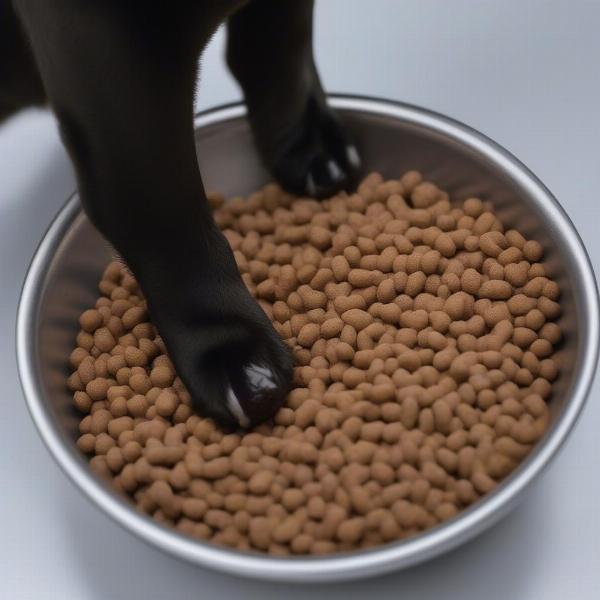The term “shadbase hot dog” seems to be a misunderstanding or a playful combination of words. While “hot dog” refers to a popular cooked sausage, typically served in a bun, “shadbase” doesn’t have a direct connection to the canine world. It’s possible this term arose from a typo or a slang term not widely recognized within the dog community. This article will clarify the likely intent behind the search query and provide valuable information on dog breeds, nutrition, and common misconceptions surrounding dog food.
While “shadbase hot dog” isn’t a recognized term, it’s likely that those searching for it are interested in what they can and can’t feed their dogs, especially concerning human foods. Many owners wonder if they can share their favorite snacks, like hot dogs, with their furry friends. This article will address this curiosity and delve into safe and healthy feeding practices for dogs.
Can Dogs Eat Hot Dogs?
While a small bite of a plain hot dog might not be immediately harmful to a healthy adult dog, they are not recommended as part of a regular diet. Hot dogs are high in sodium and fat, which can lead to health problems like pancreatitis, obesity, and heart disease in dogs. They also often contain other seasonings and preservatives that can be toxic to dogs, such as garlic and onion powder.
What if your dog snagged a bite of your hot dog? Don’t panic. Monitor your dog for any signs of digestive upset, such as vomiting or diarrhea. If your dog exhibits any unusual symptoms, contact your veterinarian immediately.
Healthy Alternatives to Hot Dogs for Dogs
Instead of offering hot dogs, choose healthy treats specifically designed for dogs. These treats are formulated to meet a dog’s nutritional needs and come in various flavors and textures. Look for treats with high-quality ingredients and avoid those with artificial colors, flavors, and preservatives.
Fresh vegetables like carrots, green beans, and cucumber slices can also make healthy and refreshing treats for dogs. Always introduce new foods gradually to avoid digestive upset.
Understanding Dog Nutrition
Providing a balanced and nutritious diet is crucial for your dog’s overall health and well-being. A good dog food should be the foundation of their diet. Choose a high-quality dog food that is appropriate for your dog’s age, breed, and activity level. Consult your veterinarian for personalized recommendations.
 Dog Food Bowl
Dog Food Bowl
Common Misconceptions about Dog Food
One common misconception is that all dog foods are created equal. However, the quality of ingredients and nutritional content can vary significantly between brands. Read the ingredient list carefully and choose a food that lists meat as the primary ingredient.
Another misconception is that homemade diets are always better than commercial dog food. While homemade diets can be healthy, they require careful planning and balancing to ensure they meet all of your dog’s nutritional needs. Consult a veterinary nutritionist for guidance if you’re considering a homemade diet.
Conclusion
While the term “shadbase hot dog” may be a mystery, it highlights the importance of understanding what constitutes a healthy diet for dogs. Hot dogs are not recommended for dogs due to their high sodium and fat content. Instead, focus on providing your dog with a balanced diet of high-quality dog food and healthy treats. Consult your veterinarian for personalized dietary recommendations and to address any concerns about your dog’s nutrition.
FAQ
- Can I give my dog a small piece of hot dog as a treat? While a tiny piece occasionally might not cause harm, it’s best to avoid hot dogs altogether due to their unhealthy ingredients.
- What are some healthy treat alternatives for my dog? Dog-specific treats, fresh vegetables like carrots or green beans, and even small pieces of cooked chicken or lean beef are healthier options.
- How do I choose a good quality dog food? Look for a food that lists meat as the primary ingredient and avoids artificial colors, flavors, and preservatives. Consult your veterinarian for personalized recommendations.
- Are homemade diets better for dogs? Homemade diets can be healthy, but require careful planning to ensure they are nutritionally balanced. Consult a veterinary nutritionist for guidance.
- What should I do if my dog eats a whole hot dog? Monitor your dog for any signs of digestive upset and contact your veterinarian if you notice anything unusual.
- Are there any human foods that are toxic to dogs? Yes, several human foods, including chocolate, grapes, raisins, onions, and garlic, are toxic to dogs and should be avoided.
- How often should I feed my dog? The frequency of feeding depends on your dog’s age, breed, and activity level. Consult your veterinarian for guidance.
ILM Dog is your trusted partner in providing the best possible care for your furry companion. We offer expert advice and resources on dog breeds, health and wellness, training, nutrition, grooming, and much more. Our focus on experience, expertise, authoritativeness, and trustworthiness ensures you receive accurate and up-to-date information. Contact us today for personalized guidance on all aspects of dog care! Email: [email protected] Phone: +44 20-3965-8624. Visit ILM Dog for a wealth of information and resources to help you navigate the wonderful world of dog ownership.